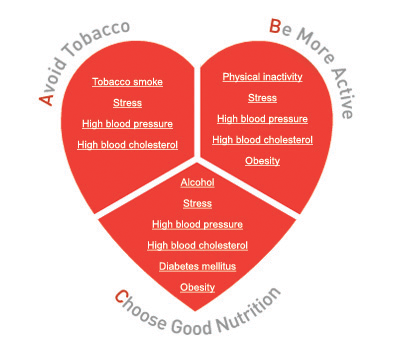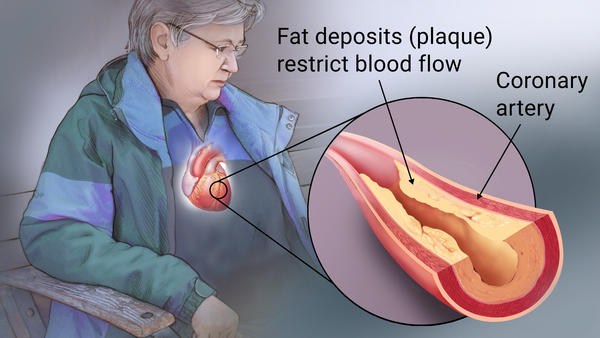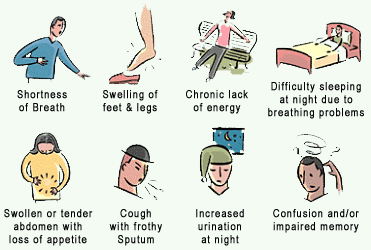Heart Failure
What is heart failure?
Heart failure is a condition in which the heart is weakened and cannot supply enough oxygen and blood to the body. To try and meet the needs of the body, the heart pumps faster and gets bigger in size. Sadly, it is not always able to keep up. Over 5 million Americans have heart failure, and it is one of the common reasons why people over 65 have to go to the hospital.
Causes and risk factors
The most common cause of heart failure is the build-up of fat in the blood vessels. Risk factors for heart failure include being overweight, having blood pressures higher than 140/90, blood sugars higher than 150, and past heart attack.
Symptoms
Symptoms of heart failure usually result from fluid collection and poor blood circulation. They include shortness of breath, swelling of the legs and/or abdomen, increased heart rate, tiredness, weakness, and confusion. How often someone has symptoms is related to how bad their heart failure is.
Heart failure is broken into stages and classes. The stages describe the changes in heart structure and the progression of the disease, while the classes describe a person’s symptoms and ability to be active.
| Stages | Classes |
| A: At risk for heart failure, but no symptoms or changes in heart structure present | I: Normal activity does not cause symptoms |
| B: Changes in heart structure are present, but there are no symptoms | 2: Comfortable at rest, but normal activity causes symptoms |
| C: Changes in heart structure are present, and there is a history of symptoms or symptoms are currently present | 3: Comfortable at rest, but less than normal activity causes symptoms |
| D: Changes in heart structure and symptoms are present, and there is no response to normal treatment | 4: Symptoms at rest; cannot do any activity |
I just got diagnosed, what can I expect?
People diagnosed with heart failure should expect to be educated and started on many treatments that can decrease hospital visits and death. These treatments are described in the section below. It may seem overwhelming, but with the help of a good healthcare team, many patients with heart failure go on to live a full quality life by managing their condition with lifestyle changes and prescription medications.
Treatments
Depending on a person’s stage and symptoms, doctors may try a number of treatments to help them feel better, prevent hospital visits, slow disease progression, and prolong life.
Lifestyle Changes:
- Maintain a healthy weight
- Increase activity
- Try walking, biking, gardening, or water aerobics for 10-20 minutes per day on three days out of the week
- Eat less fatty foods and more fruits and vegetables
- Decrease salt (sodium) intake to 2 grams (7 salt packets or 14 salt shaker dashes) per day
- Decrease fluid intake to 2 liters (eight 8 ounce glasses) per day
- Stop smoking
- There are many aids available to help people stop smoking. These include:
- Nicotine replacement therapy (nicotine gum, lozenges, and patches)
- Prescription medications like bupropion (WellbutrinⓇ) and varenicline (ChantixⓇ)
- Free quitline services that can be reached anytime at 1-800-QUIT-NOW (1-800-784-8669).
- There are many aids available to help people stop smoking. These include:
Prescription Medications:
- Beta Blockers (i.e. metoprolol succinate (Toprol XLⓇ), carvedilol (CoregⓇ), bisoprolol (ZebetaⓇ))
- Beta blockers decrease blood pressure and heart rate. They also slow/reverse changes in heart structure. They help to reduce hospital visits and death in heart failure patients.
- Angiotensin Converting Enzyme (ACE) Inhibitors or Angiotensin Receptor Blockers (ARB) (i.e. lisinopril (ZestrilⓇ, PrinivilⓇ), enalapril (VasotecⓇ), losartan (CozaarⓇ), valsartan (DiovanⓇ))
- ACE inhibitors and ARBs decrease blood pressure and decrease the force that the heart has to pump against. They also help to reduce hospital visits and death.
- Diuretics (i.e. furosemide (LasixⓇ), torsemide (DemadexⓇ), bumetanide (BumexⓇ))
- Diuretics work to prevent fluid collection. This helps to improve symptoms and activity.
- Aldosterone Receptor Antagonists (i.e. spironolactone (AldactoneⓇ), eplerenone (InspraⓇ))
- Aldosterone receptor antagonists slow the changes in heart structure and maintain normal heart rhythm. They also help to reduce hospital visits and death.
- Vasodilators (i.e. hydralazine (ApresolineⓇ), isosorbide dinitrate (IsordilⓇ))
- Vasodilators relax blood vessels and allow the heart to supply the body with more blood and oxygen without having to work so hard. They have been shown to be very helpful in African American patients that have constant symptoms.
How do I prevent flare-ups and visits to the hospital?
Committing to lifestyle changes and taking your medications as prescribed are two of the  most important factors you can control to prevent flare-ups. Weighing yourself daily can also help you identify increased fluid collection (a sign of worsening heart failure) so it can be managed before a hospital visit is needed. Preventing other illnesses like the flu or pneumonia by getting vaccinated can also prevent flare-ups.
most important factors you can control to prevent flare-ups. Weighing yourself daily can also help you identify increased fluid collection (a sign of worsening heart failure) so it can be managed before a hospital visit is needed. Preventing other illnesses like the flu or pneumonia by getting vaccinated can also prevent flare-ups.
How can HPP help?
HPP can help in a number of ways! All of the pharmacists are certified to give immunizations like the flu and pneumococcal vaccines. You can also take part in Project Harmony, which is a program that aids in care transitions by making sure that the medications that you leave a hospital or rehab facility with are the same medications that you receive at home. We send your new medication list to your primary care doctor and help schedule follow-up appointments with primary care doctors soon after discharge to prevent future hospital visits. HPP can also help you manage your medications by using special unit-dose or Dispill packaging that makes it easier to keep track of when you should take your medicine. We will even deliver your medications to your front door! Call or drop by to learn more about how HPP can help you!
Content Resources:
Yancy, Clyde W., et al. “2013 ACCF/AHA guideline for the management of heart failure: a report of the American College of Cardiology Foundation/American Heart Association Task Force on Practice Guidelines.”Journal of the American College of Cardiology 62.16 (2013): e147-e239.
Heart Failure. American Heart Association Website. http://www.heart.org/HEARTORG/Conditions/HeartFailure/Heart-Failure_UCM_002019_SubHomePage.jsp.

